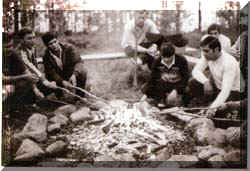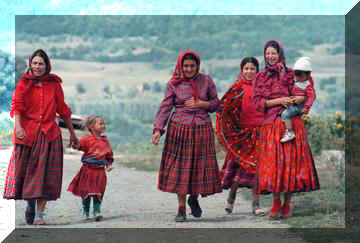

The term "Gypsy" means anyone leading a nomadic life, but it usually refers to us Roma, who are a traditionally nomadic people found throughout the world. The Roma share a common heritage that sets us apart as an ethnic group.
Not much is known about the early history of the Roma. The Roma left India in waves as early as the 5th century, but most migrations happened in the 11th century, after the Muslim invasions of India. During the early 14th century, the Roma traveled west across Iran into Asia Minor, and from there most went to Europe through Greece. The Roma first arrived in Europe over 500 years ago, and were called "gypsies" because of the incorrect belief that they had come from Egypt. They were well received in Europe at first, but their unfamiliar customs and closed society soon caused them to be unwelcome. The Roma in Spain were free under Muslim rule until the Christian conquest in 1492. After that there were several laws prohibiting Romani dress, language and customs. The Roma in France were expelled from Paris in 1539, and had to leave England in 1563 under the threat of death. In the beginning of the 15th century, many Roma were forced into slavery by Hungarian and Romanian nobles who needed laborers for their large estates.

There was also
a severe amount of persecution during World War II, when over 500,000 Roma
perished in Nazi concentration camps. They were forced into government sponsored
assimilation programs depriving them of their language and culture. Even today
we are still persecuted and under pressure to abandon our nomadic life.
We Roma are dispersed throughout Western Europe, the Middle East, North Africa, and the Americas. Because of this, the Romani culture varies in different areas of the world. One thing that all Romani have in common is a strong sense of group identity. We are very family oriented, and the elderly are held in high regard. This culture stresses the sacredness of its traditions and see contact with "non-Roma" as polluting. However, we usually adopt the religious faith of the countries we live in.

The various Romani tribes are divided into clans. Each clan is composed of families related by common descent or historical association. Leaders sometimes are titled 'King' or 'Queen', which are given as signs of respect and don't usually mean political leadership. Disputes are settled by an informal court called 'kris' that decides matters of law and custom. The worst punishment the kris gives is exclusion from the community. Romani women usually marry around 12 or 13 years of age. The marriages are arranged by the couple's parents, showing a desire to create alliances between families. It is common for the family of the groom to pay the family of the bride a dowry or bride-price to make up for the family's loss of their daughter and to guarantee that she will be treated well by her new family.
copyright 2002 Damon DeMartin